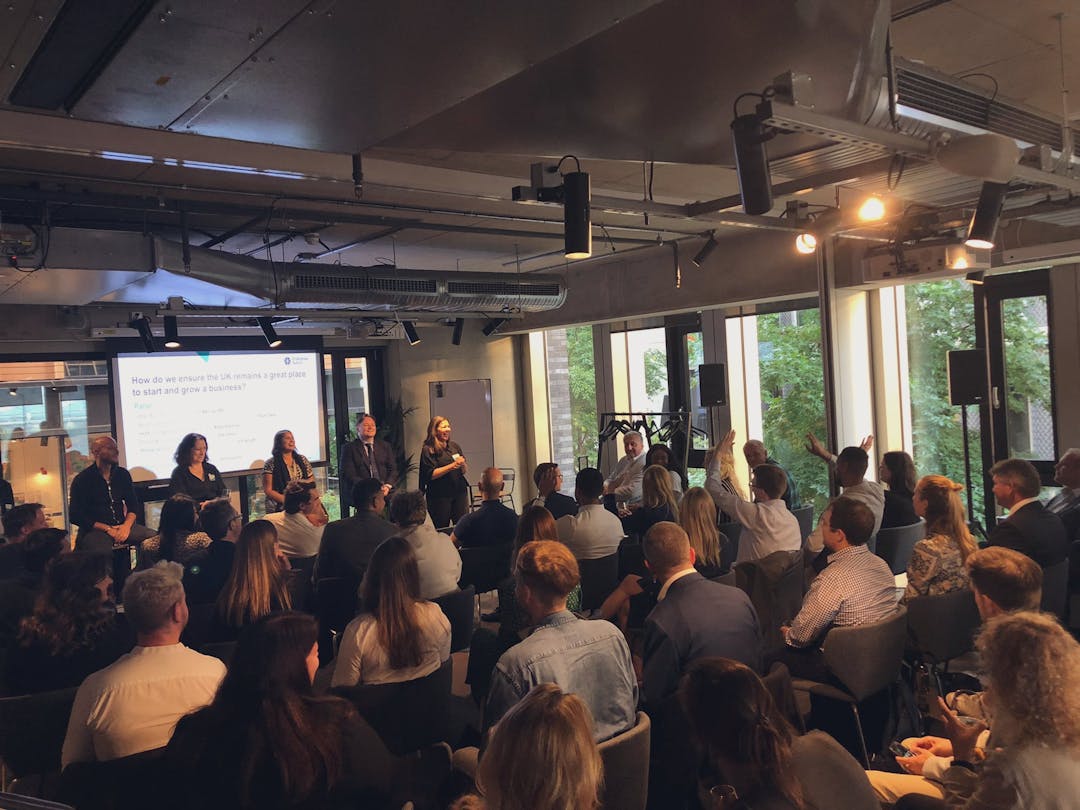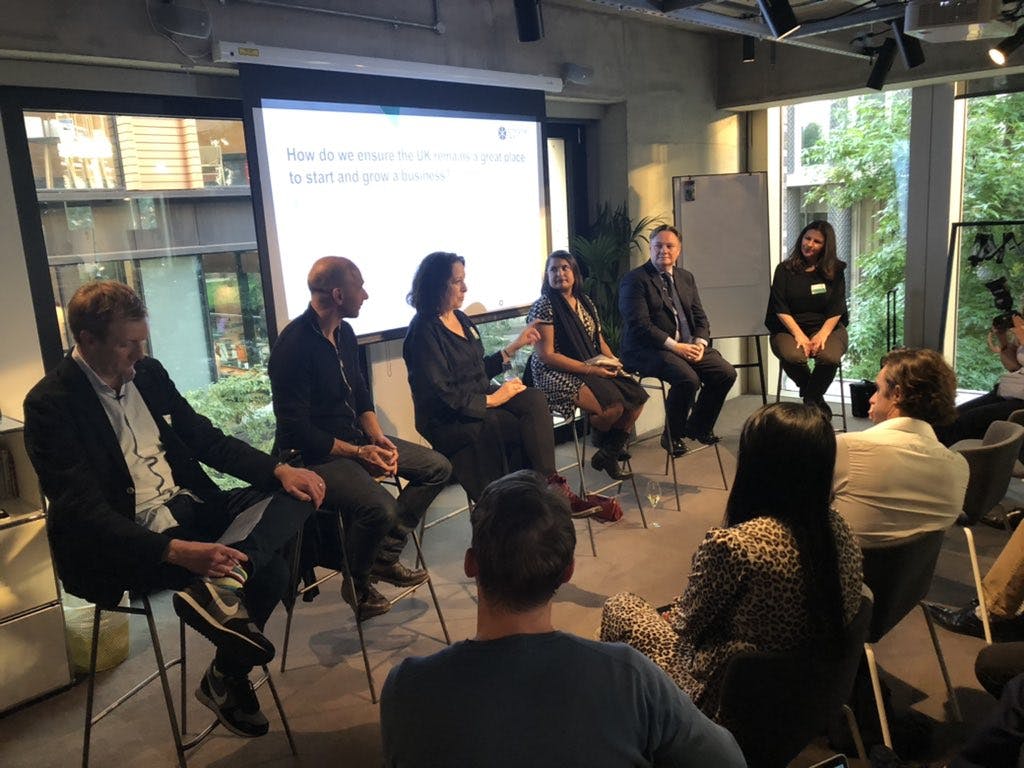How do we ensure the UK remains a great place to start and grow a business?
)
Posted: Thu 23rd Sep 2021
During Enterprise Nation’s first live partner event in 15 months, the bumper audience were treated to an evening of wit, wisdom and insight, as five industry experts gave their views on how the UK can continue catering for small businesses.
We’ve become accustomed to many things since March 2020: masks, mandates, Microsoft Teams – so the launch of Enterprise Nation’s first live event since coronavirus came along felt like a throwback, but also the dawn of a new era.
As a country, we have adapted well to create a digitally focused business world, but the resumption of face-to-face interaction, peppered with healthy debate and disagreement, was a much-welcome return to normality for the diverse range of small business owners present.
Chaired by Enterprise Nation’s very own Emma Jones, flanked by five industry-leading experts, a key post-pandemic challenge was discussed with vigour: just how can the UK remain a great place to start and grow a business?
How to build a business in the UK
On the panel for this flagship event were the following experts:
Small Business Commissioner, Liz Barclay OBE
Senior Vice President of Mastercard Center for Inclusive Growth, Payal Dalal
Head of Google Digital Garage, Richard Keelty
Co-CEO and Co-Founder, The Office Group, Olly Olsen
Managing Director, Reputation & Influence, ICAEW, Iain Wright

With a range of expertise covering a staggering array of industries and sectors, our panel provided three key pieces of advice for small business owners as to how they can thrive in the UK:
Digitisation must be inclusive
Retrain, retrain, retrain
Don’t be afraid to dispute, you DO have a voice
1) Digitisation must be inclusive
As the world prepared to batten down the hatches in the face of COVID-19, it was clear business owners would have to digitise, and while this rather demanding venture was undertaken swiftly by businesses on the whole, Senior VP of Mastercard Center for Inclusive Growth, Payal Dalal, argues this wasn’t done evenly, with institutions generally geared towards disadvantaging female and BAME entrepreneurs.
“There are lots of challenges but there is also room for optimism” she explained, as the conversation turned to how this can be rectified.
The Mastercard Center for Inclusive Growth, alongside Enterprise Nation, is therefore launching a programme called Strive: a network that provides support for small businesses through tailored feedback in the shape of events, content and expert advisers.
3 key problems Strive can help solve
Small businesses are becoming increasingly time poor, so Strive has created a one-stop hub with Enterprise Nation to send through highly personalised advice.
There’s a need to upscale, but micro businesses don’t have time to train staff. Strive doing the heavy lifting can help to alleviate this challenge.
The small business ecosystem must communicate with each other—sharing both successes and failures—so providing a network for support providers to network and communicate is paramount.
2) Retrain, retrain, retrain
Richard Keelty, Head of Google Digital Garage, revealed that around 700 businesses every day have started selling online, which may potentially lead to skill shortages, with much of the labour market unable to retrain – particularly if they were placed on furlough during the pandemic.
Google have committed to retraining one million small businesses (through their Free Digital Skills Programme, for example), which is crucial for those who need to pivot their model in order to engage customers in this highly-digitised age.
The provision of free tools such as Google Analytics and Trends to small business and large corporations alike can help even the playing field, while the introduction of 5G could see productivity skyrocket.
An example of 5G’s power can be shown in full force if you try and download the new James Bond film. Using 3G it’ll take you a day, using 4G it’ll take you seven hours. With 5G? 4 seconds. A potential game-changer for small businesses.

Why are these schemes so crucial to small businesses?
Whether it’s in a benign business environment or slap-bang in the middle of a global pandemic, start-ups will find their first 12 months tough, as reiterated by former-Labour MP and Managing Director (Reputation & Influence) at ICAEW, Iain Wright.
When asked about the National Insurance hike and dividend & corporation tax rises, and whether we’ll have a good financial ecosystem for enterprise to thrive, Mr. Wright simply stated: “announcements over the last fortnight do give cause for concern.”
The impact these changes will have on small businesses remains to be seen, but with so much uncertainty on the horizon, having a well-rounded workforce, who are able to regularly pick up important skills at no extra cost to their employers, could pay dividends in the future.
3) Don’t be afraid to dispute, you DO have a voice
Not being paid on time, or in full, can be a common problem small businesses face.
“We need to get the payments in the hands of small businesses as soon as possible, because that’s where the working capital comes from” explained Small Business Commissioner, Liz Barclay.
However, many small businesses are unwilling to run disputes against larger businesses due to the perceived risk of jeopardising working relationships.
Ms. Barclay was keen to emphasise how small businesses are regularly the ones coming up with the business ideas, so receiving prompt payments—through disputes via the SBC or otherwise—should be top of all parties’ agenda.
A cause for optimism is that many large businesses (including a couple of major supermarket chains) have signed up to the Prompt Payment Code, a scheme designed to ensure small businesses are always paid on time, which negates the risk of serious reputational damage.
A final word from Olly
The contribution that perhaps resonated loudest and longest among the audience came from Co-CEO and Co-Founder of The Office Group, Olly Olsen: “the biggest lessons I’ve had are from the biggest mistakes I’ve made.”
Speaking about his time washing dishes in a creperie, his willingness to do so-called ‘menial jobs’, his constant eagerness to challenge those in authority, he told a tale of how determination and persistence can bear fruit in weird and wonderful ways.
A born orator, whose experiences were conveyed in a way which would have been impossible over the confines of Zoom. It’s good to be back.
Get business support right to your inbox
Subscribe to our newsletter to receive business tips, learn about new funding programmes, join upcoming events, take e-learning courses, and more.
Start your business journey today
Take the first step to successfully starting and growing your business.
Join for free
